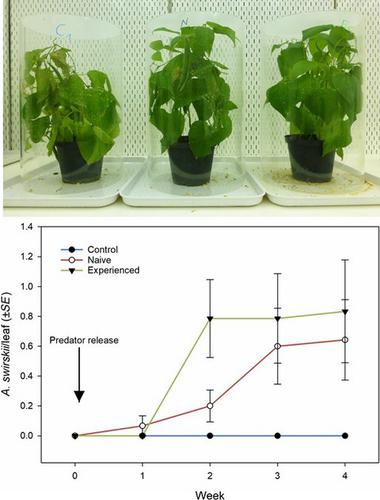当前位置:
X-MOL 学术
›
J. Appl. Ecol.
›
论文详情
Our official English website, www.x-mol.net, welcomes your feedback! (Note: you will need to create a separate account there.)
Learned predators enhance biological control via organizational upward and trophic top‐down cascades
Journal of Applied Ecology ( IF 5.7 ) Pub Date : 2020-11-06 , DOI: 10.1111/1365-2664.13791 Peter Schausberger 1, 2 , Demet Çekin 2 , Alena Litin 1
中文翻译:

博学的捕食者通过组织的向上和营养自上而下的级联反应增强生物控制
更新日期:2021-01-07
Journal of Applied Ecology ( IF 5.7 ) Pub Date : 2020-11-06 , DOI: 10.1111/1365-2664.13791 Peter Schausberger 1, 2 , Demet Çekin 2 , Alena Litin 1
Affiliation

|
- Learning is a behavioural change based on memory of previous experiences and a ubiquitous phenomenon in animals. Learning effects are commonly life‐stage‐ and age‐specific. In many animals, early life experiences lead to pervasive and persistent behavioural changes.
- There is broad consensus that learning has far‐reaching implications to biological control. Proximate and ultimate factors of individual learning by parasitoids and true predators are relatively well understood, yet the consequences of learning to higher organizational levels, populations and communities, and top‐down trophic cascades are unexplored.
- We addressed this issue using a tri‐trophic system consisting of predatory mites Amblyseius swirskii, Western flower thrips Frankliniella occidentalis and whole common bean plants, Phaseolus vulgaris. F. occidentalis are notorious horticultural pests that are difficult to control. Therefore, practitioners have much to gain by optimizing biological control of thrips.
- Previous studies have shown that early life experience of thrips by A. swirskii improves foraging on thrips later in life due to decreased prey recognition times and increased predation rates, together enhancing predator fecundity. Here, we hypothesized that early learning by A. swirskii enhances biological control of thrips via immediate and cascading effects. We predicted that release of thrips‐experienced predators enhances predator population growth and thrips suppression and reduces plant damage as compared to release of thrips‐naïve predators.
- The behavioural changes brought about by early learning cascaded up to the population and community levels. Thrips‐experienced predators caused favourable immediate and cascading effects that could not be compensated for in populations founded by thrips‐naïve predators. Populations founded by thrips‐experienced predators grew faster, reached higher abundances, were more efficacious in suppressing an emerging thrips population and kept plant damage at lower levels than populations founded by thrips‐naïve predators. Plant fecundity correlated negatively with thrips abundance and positively with predatory mite abundance. Improved biological control was mainly due to thrips‐experienced founders providing for a head‐start in predator population growth and thrips suppression.
- Synthesis and applications. Our study suggests that learned natural enemies have high potential to optimize augmentative biological control on a larger scale due to favourably modulating organizational upward and trophic top‐down cascades.
中文翻译:

博学的捕食者通过组织的向上和营养自上而下的级联反应增强生物控制
- 学习是一种基于对以前经验的记忆和动物中普遍存在的现象的行为改变。学习效果通常是生命阶段和特定年龄的。在许多动物中,早期的生活经历会导致普遍的和持续的行为改变。
- 人们普遍认为学习对生物控制具有深远的影响。对寄生虫和真正的天敌的个体学习的近因和终极因素是相对了解的,但是对于更高的组织水平,人口和社区以及自上而下的营养级联学习的后果尚待探讨。
- 我们使用三营养系统解决了这个问题,该系统由掠食性螨Amblyseius swirskii,西方花蓟马Frankliniella occidentalis和整个普通豆类植物菜豆(Phaseolus vulgaris)组成。西花蓟马是臭名昭著的园艺害虫,难以控制。因此,从业人员通过优化对蓟马的生物控制可以获得很多好处。
- 先前的研究表明,由于减少了猎物的识别时间并增加了捕食率,A。swirskii对蓟马的早期生活经验改善了其在蓟马后期的觅食,同时增强了捕食者的繁殖力。在这里,我们假设A. swirskii的早期学习通过即时和级联效应增强了对蓟马的生物控制。我们预测,与未经蓟马捕食者的释放相比,释放有蓟马的捕食者可以增强捕食者的种群增长和蓟马抑制,并减少植物的破坏。
- 早期学习所带来的行为改变逐渐蔓延到人口和社区层面。经历过蓟马的捕食者造成了有利的即时和连锁影响,而对于那些天真的蓟马捕食者所建立的种群来说,这是无法弥补的。与经验丰富的蓟马捕食者相比,由经验丰富的蓟马捕食者建立的种群增长更快,丰度更高,在抑制新兴蓟马种群方面更有效,并将植物的破坏程度保持在较低水平。植物繁殖力与蓟马含量呈负相关,与捕食螨含量呈正相关。更好的生物控制主要是由于有蓟马经验的创建者为捕食者种群的增长和蓟马抑制提供了先机。
- 综合与应用。我们的研究表明,由于天生的天敌有利地调节了组织的向上和营养自上而下的级联反应,因此他们有较大的潜力在更大范围内优化增强生物控制。



























 京公网安备 11010802027423号
京公网安备 11010802027423号